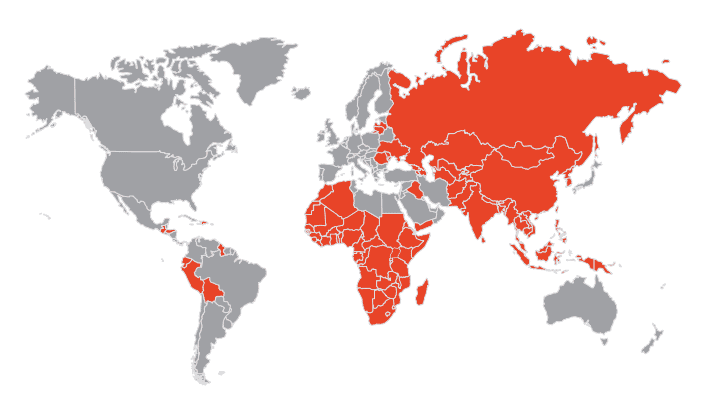
Are you travelling to one of the GREY areas?
No traveller's advice for tuberculosis required.
Are you travelling to the red areas?
Tuberculosis is an infectious disease that is more common in these countries than in the Netherlands. You may therefore run a
slightly higher risk of infection. Following the advice in this leaflet will minimise the risks.
We advise you to make an appointment at GGD's TB control department:
- If you have reduced immunity due to illness or by taking medication;
- Ó,
If you will work or stay in a hospital, prison or homeless institution for 1 month or more,
addicts, refugees or HIV-infected people - Ó,
if you are going to stay in these areas for more than 3 months. This also applies to regular short trips
within one year, which together exceed 3 months. - Ó,
if you regularly travel with children under 5 who have not been vaccinated against tuberculosis with BCG and you
expects the child to spend a total of at least 3 months in these areas before the age of 5.
In all other cases, we advise you to read the general information in this leaflet carefully.
What will the TB control department of the GGD do?
Depending on your risk of infection during your trip, the GGD will advise you on:
- Vaccination with BCG before travel (preferably at least 6 weeks before departure).
- And/or check for TB infection after the trip.
More information
For more specific information on travel and tuberculosis such as country information and testing options see: www.tuberculose.nl
We wish you a happy journey!
What is tuberculosis?
Tuberculosis is an infectious disease that is still common in certain countries.
Tuberculosis is caused by the tubercle bacterium. This bacterium mainly causes inflammation in the lungs.
However, tuberculosis can also occur in other parts of the body.
Tuberculosis can have a serious course. It is important to detect and treat an infection with tuberculosis in time.
The disease can be cured well with a course of medication. Here, it is important that the drugs are used throughout the
prescribed period be taken as prescribed.
If this does not happen, the bacteria may become insensitive (resistant) to the drugs.
Treatment then has to be done with other drugs and takes longer.
Resistant forms of tuberculosis are increasingly common.
How does a person get tuberculosis?
Only people with infectious pulmonary tuberculosis can infect other people. A person with tuberculosis in the lungs often has to cough and sneeze.
In the process, bacteria can come out. These bacteria can stay alive in small dark spaces for some time.
They float in the air when there is little ventilation. Breathing in these bacteria can infect a person.
Not everyone who inhales the bacteria gets sick. The tubercle bacteria can remain in the body for a very long time
without causing symptoms. This is because the body makes antibodies that are usually sufficient to prevent or even cure inflammation.
A person with normal immunity has a 10% chance of developing the disease tuberculosis after infection.
Generally, it takes at least 6 weeks before the first symptoms of illness can appear after infection.
What can you do yourself?
Infection occurs mainly through coughing. You can reduce the risk of infection by keeping as much as possible out of the
stay away from "violent" coughsters. If you cannot, you can take some precautions yourself.
This can be done, for example, by breathing through your nose as much as possible, covering your mouth with a scarf, handkerchief or an appropriate mask.
You can get more advice on this from the TB control department of the GGD.
Good cough hygiene (think "hand in front of mouth" and turning away the face) is an important preventive tool in tuberculosis.
Small, dark and poorly ventilated spaces - small housing, shacks, slum dwellings in slums -increase the risk of infection.
Keep this in mind.
The most common symptoms in tuberculosis are:
- Coughing
- Fatigue
- Fever/night sweats
- Lack of appetite
- Weight loss
If you have cough symptoms for more than 3 weeks, you are advised to consult a doctor.
Always tell the doctor that you have been abroad.
Download the RIVM leaflet below!

